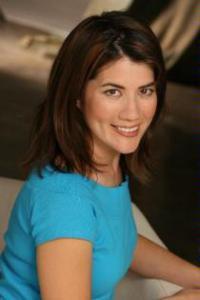How to Be an American Housewife is a work of fiction, but includes incidents that were told to me by my mother. So why did I write a novel and not a memoir? Wouldn’t it have been easier to compile the stories my mother told me?
Most every writer and reader has seen Truman Capote’s quote: “Fiction is the truth inside the lie.” In writing this book, my truth came from fiction, as strange as that may sound.
A memoir, culled strictly from real life, would have taken place only from my very limited perspective, not my mother’s. A memoir would have had its ending in my mother’s hospital bed, with her telling me, “You can do what you want. I am proud of you,” and me standing there, trying to reconcile years of rockiness with these fond words.
In a memoir, I would not have been free to imagine a whole other life, to see through another’s eyes. In fiction, I created characters that are like me and my mother, but not. They don’t exactly act like we did, and they certainly lead different lives. I felt it was important to have the book take place in Japan, to have the character Sueexperience viscerally what it was like to discover a whole existing family where before there had been a void.
Creating characters also allowed me the distance to carefully consider my relationship with my mother. To pull out what was important. To make up a plot with themes I wanted to emphasize, rather than the actual events, which might have been rather lackluster and lacking in insight.
Anyway, in many ways memories turn into fiction. Everyone remembers things differently. People leave out important details because they forget, or it’s not important to them. For example, even today, my father tells me additional stories of my mother and Japan that I never knew: that her family was a shogun (samurai) family, that many Japanese women who married Americans were of the untouchable class and had no prospects in the country. (And sometimes I say, Why didn’t you tell me earlier? I could have included that in the book!)
Nonetheless, I did choose to include some actual events in the novel. My mother told me stories of what it was like coming of age in wartime Japan, and of living among former enemies in the U.S. She told me how she worked for Americans, how her father wanted her to marry an American and actually did have her take photos of all her prospects so she could choose my father. Like the mother in the book, she told me these stories beginning in my childhood. I never liked to hear of her hardships.
And of course, there was the inspiration book: The American Way of Housekeeping. My mother had a copy of the book, written in Japanese and in English, telling housekeepers how to keep a proper house for the military occupying the country. Yes, housekeepers. The book was made for housekeepers, but was also a handy guide, apparently, for new Japanese brides marrying Americans. It was popular enough to go through several printings and editions and be sold at the PX, or military base store; one book I found online had the PX stamp and an inscription to a wife.
I used the nonfiction book as the basis for my fictional How to Be an American Housewife, which turned into a nice structure for the novel, the skeleton, so to speak. But the real stories are in some ways secondary to the meat of the book.
What the book is really about is how a mother and daughter overcome years of miscommunication, gaps real and imagined in both language and culture. It’s about how to come to terms with wanting what you have, not what you wanted to have. And it’s about living with hope and finding redemption, both themes that perhaps would have been less possible to have in a memoir.
How to Be an American Housewife is Margaret Dilloway’s first novel. For more on Dilloway, who lives with her husband and three children in Hawaii, visit her website.
RELATED CONTENT
Read a review of How to Be an American Housewife.






